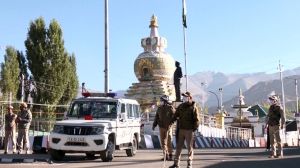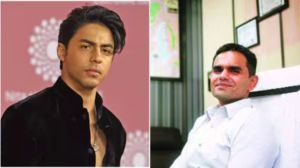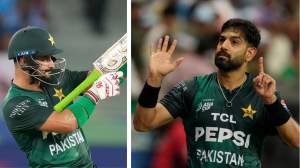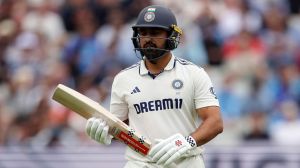After her anguish over Kolkata rape-murder, can President Droupadi Murmu nudge the system?
As the custodian of the Constitution, the President can reach out to the young, particularly young women, to “counter the mindset which sees women as lesser human beings”.
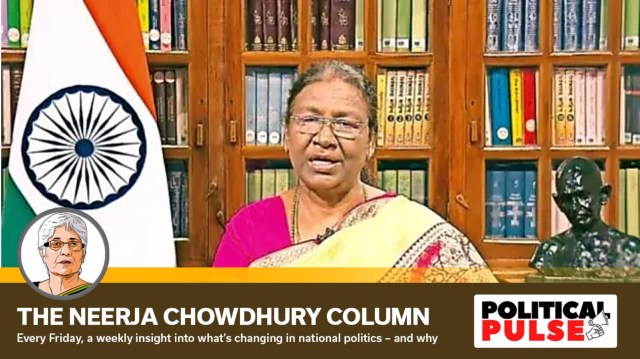 Never has Rashtrapati Droupadi Murmu spoken out the way as she has done on the rape and murder of a 31-year-old doctor in Kolkata, saying that “enough is enough”. (File Photo)
Never has Rashtrapati Droupadi Murmu spoken out the way as she has done on the rape and murder of a 31-year-old doctor in Kolkata, saying that “enough is enough”. (File Photo)If the President of India publicly expresses outrage — and does so in strong terms — it is something to seriously take note of. Never has Rashtrapati Droupadi Murmu spoken out the way as she has done on the rape and murder of a 31-year-old doctor in Kolkata, saying that “enough is enough”.
Normally, coming from the head of state, it would be seen as an indictment of the governments, state and Centre. It would be read as the country’s First Citizen asking them to shape up and bring the guilty to book. In other words, Mamata Banerjee as CM must not protect the guilty and the Centre must ensure that the CBI, which is investigating the case, does so in a fair and free manner and keeps the state government in the loop about its findings.
But in a polarised polity, there are other questions. Was a case being made for President’s Rule in West Bengal, particularly as West Bengal Governor C V Ananda Bose came calling on the Union Home Minister in Delhi? Others questioned the silence on gruesome cases of assault in Manipur.
Having failed to get the better of Mamata Banerjee politically, many in the BJP may be tempted by the thought of President’s Rule in West Bengal, now that “Didi” appears on the backfoot. Central rule can be imposed only if the Constitutional machinery breaks down; a constitutionally elected government cannot be sent packing just because there are problems on the law-and-order front. It would also be politically hazardous to risk turbulence in West Bengal at present. With an unsettled Bangladesh on its borders, it could have ramifications for the eastern and northeastern parts of India.
Sensing the stirrings taking place among women, and the political opportunity it presents for their mobilisation, parties are using it to attack each other and this is in full play in Kolkata — when, beyond a point, it should be uniting the entire political class to make sure that justice is done.
Political Indignation is also selectively expressed. When a Dalit woman in Hathras was gang-raped and murdered in 2020 — the authorities cremated her in the dead of the night without informing her family — Congress leaders Rahul Gandhi and Priyanka Gandhi Vadra led the charge and travelled to Hathras. Neither of them has visited Kolkata so far though they condemned the doctor’s rape and murder, something that the Congress’s opponents see as mere “tokenism”. Rahul subsequently drew the TMC’s wrath when he blamed administrative lapses for what happened.
The BJP, too, was found wanting in its response to Hathras, which happened in a state where it has been in power for over seven years.
This is not to say that there is no place for competitive politics in a parliamentary democracy. Had the BJP not backed the protesting doctors on the streets of Kolkata, it would not be worth its salt as an Opposition party. Had the Opposition parties not flayed the extraordinary remission of 11 men in Gujarat convicted of raping Bilkis Bano and killing her family members — the men were released and feted — they too would have been found wanting (the Supreme Court cancelled their remission earlier this year). But there comes a moment when a “laxman rekha” has to be drawn by the political parties and this is fast disappearing.
Capital punishment was the first cry of an outraged public and the political class in the Kolkata case. Mamata Banerjee and others have called for the strengthening of the anti-rape law and capital punishment for the rapist. Prime Minister Narendra Modi has suggested that the punishment meted out to rapists should be as widely publicised as the case itself for it to become a deterrent. However, is capital punishment a deterrent?
India probably has amongst the toughest anti-rape laws of any democratic country. It is their implementation that needs toughening. After the 2012 “Nirbhaya” case in Delhi and the setting up of the Justice Verma Commission, a Nirbhaya helpline (112) was put in place as was a Nirbhaya Fund. Sadly, even after 10 years, less than half of the fund was put to use, showing both a lack of imagination and a lack of will by those in power.
President Murmu’s election as the President would have made every tribal girl in the country feel she too could make it. It made many feel proud that finally, a tribal woman from India’s peripheries was heading the Indian state and its armed forces. Given her strong words now, all eyes will be on President Murmu: the steps she takes to help bring about a “change in mindset”, about which she spoke with feeling; if she can nudge the system without breaching the Constitutional red lines that circumscribe her powers; and if she can encourage those who are already fighting the fight.
Former President A P J Abdul Kalam saw children as “life’s longing for itself” and became known as the “children’s President” as he opened the doors of the sprawling Rashtrapati Bhavan to them. As the custodian of the Constitution, which guarantees women equal rights and a life of freedom and dignity, President Murmu can also reach out to the young, particularly young women, to “counter the mindset which sees women as lesser human beings”, as she said in her remarks about the Kolkata case.
The truth is that when it comes to crimes against women, we all have a guilty conscience.
(Neerja Chowdhury, Contributing Editor, The Indian Express, has covered the last 11 Lok Sabha elections. She is the author of How Prime Ministers Decide)



- 01
- 02
- 03
- 04
- 05








